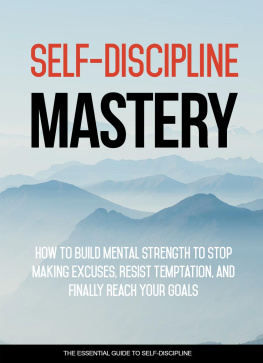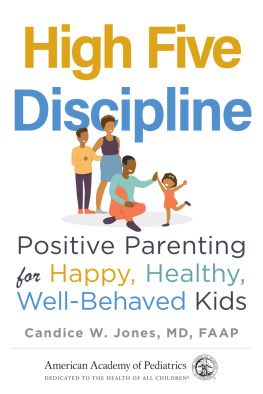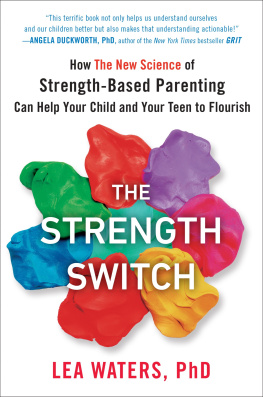

Five essential disciplines
African american parents must
Teach their children and teens
ROBERT L. JOHNSON, M.D.
PAULETTE STANFORD, M.D.
HARLEM MOON
BROADWAY BOOKS
NEW YORK
Contents
Making the Transition from Child to Adult
Ten Racial Stereotypes That Won't Go Away
Building the Towers of Self-Love in Black Children
Summary: Ten Ways to Help Black Children Feel GoodAbout Themselves
What Are Parenting Styles?
Parenting Styles in African American Families
Helping Black Children Appreciate the Value of Discipline
When Two Parents Disagree About Discipline
Raising a Child on Your Own
Creating a Functional Stepfamily
Discipline and a Healthy Family Environment
How Do the Members of Your Family Interact?
Summary: Ten Rules for Setting Behavioral Limits
How to Spark Racial Discipline
Teach Your Child to Understand the Impact of Race
Teach Your Child to Know Where Home Is
Teach Your Child to Cultivate Positive Human Values
Teach Your Child to Recognize What's Most Important
Teach Your Child How to Win
Summary: Ten Ways to Help Young African Americans Achieve Racial Discipline
Fortify Black Children and Teens with the Discipline to Avoid Substance Abuse
Motivate Young People to Avoid High-Risk Sex
Keep Children and Teens Safe from Violence and Abuse
Summary: Eight Ways to Build Emotional Discipline
The Achievement Gap: Racial Disparities to LookOut For
Help Your Child Develop the Discipline That Fosters School Success
Help Your Child Negotiate Racial Barriers in School
Help Your Child Deal with the Pressures of Being Black and a Good Student
Expose Your Child to a Variety of Mentoring ExperiencesBoth In and Out of School
Take an Active Role in Your Child's Education
Monitor Your Child's Academic Progress Every Stepof the Way
Make Sure Problems in School Are Properly Identified and Corrected
Summary: A Seven-Step Formula for Academic Achievement
Why Higher Education Is Especially Important for African American Children
Instill in Your Child the Desire to Go to College
Plan Now to Pay for College
Select the Right College Environment
Deciding If a Historically Black College (HBCU) Is Bestfor Your Son or Daughter
Summary: Seven Ways to Help Young African Americans Succeed in College
Truths and Myths About African Americans and Money
Teach Financial Responsibility at Any Age
Explain Jobs and Careers
Help Children Develop Critical Career Skills
Summary: Seven Ways to Promote Financial and CareerDiscipline
Understanding the Stages of Adolescent Psychosocial Development
Parent Guide to Monitoring Adolescent Development
Instilling Physical Discipline in Black Youth
Find the Best Medical Care for Your Family
Building Mental Muscles in Black Youth
Negotiation
Achieving Balance
Helping African American Children Develop a StrongPersonal Identity
Helping African American Children Develop a Spiritual Center
Summary: A Seven-Step Program for Raising a Well-Balanced Child
To our parents,
Robert Johnson, Clalice Johnson,
Edward Stanford, and Gwenilda Stanford.
They gave us the strength for our journey.
Acknowledgments
THE FOLLOWING PERSONS were instrumental in the creation of this work: Linda Konner, Janet Hill, Toisan Craigg, Jamie M. Forbes, Keith Bratcher, Marie Ellis, and Wadene Howard. Special thanks to our coauthor Gene Busnarand to the thousands of African American families who have contributed to our collective expertise.
Foreword
I HAVE SPENTfour decades as a pediatrician and a trainer of pediatricians. During that time, it has become clear to me that the most important task I can perform as a physician and a teacher is to help mothers and fathers become more competent parents. There is no question that, regardless of an infant's biological inheritance, his or her chances of growing up healthy and fulfilled increase in direct proportion to the quality of the parenting provided. Drs. Johnson and Stanford have written a book that shows mothers and fathers how to dramatically improve that quality by fostering the essential disciplines young African Americans need to thrive and succeed.
Strength for Their Journey is written in a clear, anecdotal style. Here readers will find a wealth of practical information and valuable advice. The chapters cover such universal parenting themes as talking to children about drugs, motivating young people to avoid high-risk sex, and recognizing how a parent's own problems can undermine discipline. The authors tailor these topics to the needs of African American parents, and never lose sight of the extraordinary challenges black children face in this society.
Given my professional background, not to speak of my personal experience as a father and grandfather, I would like to think of myself as someone well versed in the challenges faced by African American parents. But I must confess that reading this book gave me new insight and a new depth of understanding. I have every confidence that parents who apply the authors' Five-Discipline Program will be giving their children a powerful vaccine against racism and bigotry, which continue to be major health hazards for our kids.
I am so glad that Dr. Johnson and Dr. Stanford decided to write Strength for Their Journey. I truly believe that it can change livesand save lives.
LOUIS Z. COOPER, MD
President, American Academy of Pediatrics
Introduction
WHEN WE GRADUATEDfrom medical school in the early 1970s, we were the only African Americans in our respective classes. Even today, less than 4 percent of doctors in the United States are African Americans. Still, there's reason to be hopeful about the future.
As we teach and do our hospital rounds, we feel proud to see the growing number of black medical students in our midst. We especially enjoy hearing them greet us as brother or sister, a greeting that our white colleagues sometimes misinterpret as a lack of respect. But we understand that these aspiring African American doctors are really saying, Thanks for opening the door, and making the journey easier for me. They are also saying, I'm proud of my own accomplishments, and I understand my responsibility to those who wish to follow my lead.
We credit our parents for teaching us that it's important to achievenot just for ourselves, but also for the positive impact that individual successes can have on other African Americans. This sense of connection and obligation has always been a source of strength in the black community, but it is an ethic that parents must nurture in their children.
As black doctors and educators, we feel a responsibility to those who follow us professionally, and to our community as a whole. That's why we both find time to mentor inner-city youth, and why we decided that it was important to write a book that shows African American parents how to give their sons and daughters the tools to succeed on the often rocky journey of life.
The Evolution of an Idea
In many respects, black children's needs are the same as those of their white counterpartsespecially during the first few years of life. However, once the black child enters school, he or she begins to face a number of race-specific challenges. The most effective way for parents to give children the strength to meet those challenges is by instilling discipline. However, discipline is not just about punishing kids when they get out of line; it's about giving young people the inner strength they need to achieve success and fulfillment. Setting firm limits is important, but it's just one of five critical, interconnected disciplines parents must teach.
Next page









